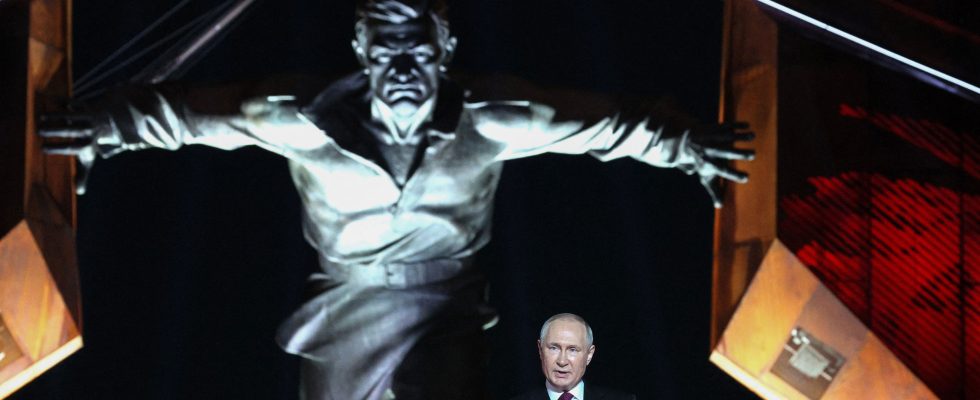Like Icarus, who died of burning his wings by flying too close to the sun, Evgueni Prigojine – who, after having rubbed shoulders with him, had dared to openly defy Vladimir Putin – ended his life by falling from the sky, on August 23 at the end of afternoon. Due to damage probably due to sabotage, his private jet, with ten people on board, then began a vertiginous fall before crashing in an inferno of flames, equidistant from Moscow and Saint Petersburg. No one knows if a depressurization of the device instantly knocked out one of the greatest war criminals of the century or if the “boss” of the Wagner mercenary group had time to fast-track the wire of his extraordinary and monstrous destiny. Disappeared at 62, the man with a shaved head will have spent almost ten years in prison, sold hot dogs at the fall of the USSR, built an empire in the restaurant business, influenced the 2016 American elections thanks to the fake news manufactured by his “troll farms”, protected juntas in Africa and recruited prisoners to fight on the front line on the Ukrainian front, in the Donbass.
The ex-con probably knew it: he had signed his death warrant by launching his troops and tanks – exactly two months before his plane crash – into a mutiny that began with the capture of a military base in Rostov- on the Don, and which had only stopped 200 kilometers from Moscow, after having shot down a plane and several helicopters of the Russian regular army on the way. With incredible audacity, his coup had humiliated the head of the Kremlin, exposing to everyone’s eyes, behind the facade, the weakness of his power. The “tsar”, who considers treason to be the supreme crime, took his time, then he struck hard, like a mafia boss, to restore his flouted authority.
Although nothing is proven, the August 23 crash bears Putin’s signature. “In all cases of previous assassinations, such as those of journalist Anna Politkovskaya or opponent Boris Nemtsov, Russian public opinion has always considered other perpetrators, notes exiled journalist Andrei Soldatov, a specialist in the secret services But when it comes to Prigozhin, no one thinks it’s anyone other than Putin.” “Even if Defense Minister Sergei Shoigu probably wanted to kill Wagner’s boss, it seems difficult to conceive, given the importance of this character, that such an initiative could be taken without being validated at the most high level,” adds historian Galia Ackerman.
“Only the tip of the iceberg is visible today”
Prigojine’s death adds to a long list of characters who have died in suspicious circumstances – killed in the street, defenestrated, victims of cardiac arrest, poisoned. But a “qualitative leap” has occurred. This time it is not an opponent or a journalist, but someone close to Putin, a key cog in his system. The modus operandi also crosses a notch in violence. “By shooting down a private jet,” Soldatov continues, “and by killing several innocent people unrelated to Prigozhin’s crimes, like the crew of the plane, the level of brutality sends a very, very strong message.”
Feeling threatened, Vladimir Putin becomes more and more totalitarian and Stalinist. “A purge is underway, of which only the tip of the iceberg is visible today,” notes historian Françoise Thom. On the very day of the plane “crash”, General Surovikin, an ally of Prigozhin, once in charge of the offensive in Ukraine, was dismissed from his post. And a month earlier, it was the influential nationalist blogger and ex-Donbass separatist leader Igor Girkin who had been arrested for “extremism”. His fault ? He criticized the Kremlin’s incompetence in the conduct of the war.
Putin acts in a systematic way, attacking emblematic personalities in the sectors he wants to bring to heel. He seeks to instill a sense of panic. Often, “the repression does not target the leaders of the system but their number 2: a deputy minister for example. In Russia, everyone understands the message, specifies Andrei Soldatov. You arrest a person not because of what she did, but so the FSB could get information about other people in her department. So everyone gets scared.”
For now, Putin’s takeover is total. But for how long ? If the “tsar” reinforces his power immediately, he also sends a signal of weakness, since from now on his only way of being obeyed is through terror. By this very fact, the master of the Kremlin could have fallen into the “trap of the dictator”, writes the American political scientist Brian Klaas in the review The Atlantic. “Putin made the classic mistake of all dictators: wrongly confusing force with ruthless violence. When dictators start killing high-ranking members of the regime, paranoia sets in and grows. But if those around them fear for their own safety, then a palace coup becomes more likely.”
Especially since the roots of Wagner’s rebellion – criticism of the inefficiency of the military command in Ukraine – are far from having disappeared. Worse, the elimination of Prigojine and the arrest of General Sourovikine create moods in the army, where they had many supporters. “This crisis within the troops, in the middle of the war, can only weaken Putin’s regime, insists Françoise Thom. When the elite understands that the leader’s priority is his own survival and his prestige, to the detriment of the effort of war, she is tempted to eliminate him. This is the origin of the failed putsch of the German generals against Hitler in July 1944.” Which leads us to this paradox, pointed out by historian Galia Ackerman, “the more Putin cracks down, the less safe he is”.
